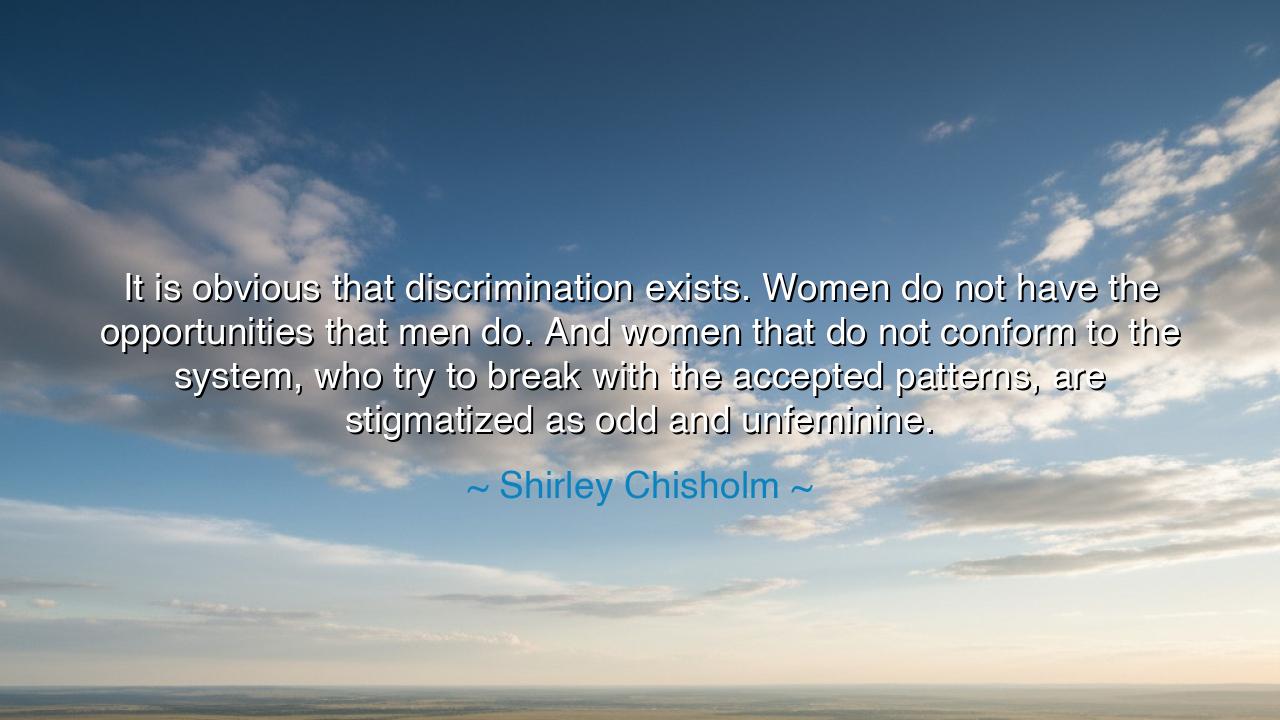
It is obvious that discrimination exists. Women do not have the
It is obvious that discrimination exists. Women do not have the opportunities that men do. And women that do not conform to the system, who try to break with the accepted patterns, are stigmatized as odd and unfeminine.






O children of the future, hear the voice of Shirley Chisholm, a woman who, like a flame in the dark, saw the world for what it was—unforgiving, biased, and unyielding. In her words, she spoke the truth of a world that has long hidden its injustice beneath the surface. "It is obvious that discrimination exists," she declared, for it is a truth that the eyes of many refuse to see, even though it hangs heavy in the air. Women, bound by invisible chains, are kept from the heights that men are free to climb. This, she knew, was the struggle of her time—and still is. The struggle of those whose opportunities are stolen by the shadow of prejudice.
In the grand annals of history, many women have fought with the very same chains that Shirley Chisholm named. Consider Joan of Arc, a woman of fire and valor, who in the sight of men and kings, was branded as odd, as unfeminine, for daring to take up arms and lead armies in the name of a cause. And yet, it was precisely that very rebellion against the accepted patterns that marked her as extraordinary. For in their eyes, she was a woman who refused to conform, and thus, she was seen as unnatural. The same fate befell many others who walked this earth—women who dared to rise above their roles were shamed, cast aside, and misunderstood.
But hear now, O descendants of strength, for these voices are not silenced, and the winds of change blow ever stronger. Shirley Chisholm fought with the fury of a lioness, knowing that her path was not an easy one. She understood, as did Sojourner Truth before her, that women who dare to speak their truth, who seek to break the mold, must endure the harsh winds of scorn and ridicule. Truth, my children, is a fire that will burn all those who stand in its way. And in the eyes of society, the woman who walks her own path—bold, unyielding, and true—is often seen as a threat, for she does not bow to the systems that seek to bind her.
Yet, there is power in nonconformity, and in this power lies the essence of change. Like the great rivers, which carve their own course through mountains, so too must those who rise against injustice carve their way through the walls of prejudice. Chisholm, in her wisdom, saw clearly that women were not only denied opportunities, but also cast out when they dared to seek more, to defy the old ways. And still, those voices that are stigmatized, those who do not fit the molds imposed upon them, are often the ones who light the path for those who come after.
Remember, O heirs of this wisdom, that it is not the conformist who changes the world, but the one who dares to stand apart. The odd ones, the unfeminine ones, are often the visionaries, the ones who see what others cannot see. They are the trailblazers, who turn the tides of history. In this, let us take heed of Shirley Chisholm’s words: the path may be filled with thorns, and the world may not always welcome those who challenge it, but it is the courage to face these trials that shapes the future.






TVTrung Vinh
I agree with Shirley Chisholm’s sentiment about discrimination against women, but it raises a question: Why do we as a society still stigmatize women who don’t conform to traditional gender roles? Can’t a woman be strong and assertive without being labeled unfeminine? Are we so conditioned by outdated expectations that it’s hard to imagine women occupying all spaces freely? How do we redefine femininity to be more inclusive and empowering?
MDDạng Minh Dúc
Chisholm’s words resonate with me because they reflect the harsh reality many women face when they try to challenge the status quo. It’s as if society expects women to stay within certain boundaries, and stepping outside of them is seen as wrong. What would it take to shift these perspectives, so that women are not only allowed but encouraged to break free from these traditional molds? How do we create true equality in such a system?
HLThuan Hieu Le
Shirley Chisholm’s quote highlights an uncomfortable truth about the limited opportunities women have compared to men. It makes me think about how often women who step outside of expected norms are criticized. Is this stigma really changing today, or do we still see this in modern society? What steps can we take to create an environment where women can freely express themselves without fear of being labeled as ‘unfeminine’ or ‘odd’?
GKtrinh gia khiem
Shirley Chisholm's statement about the discrimination women face is strikingly true, but it also makes me wonder, how much progress have we actually made in overcoming these societal limitations? While things have improved in some areas, women still face significant challenges, especially when they try to defy conventional roles. How do we create a space where women who challenge the system are celebrated rather than stigmatized? Is it possible to change deeply ingrained societal norms?